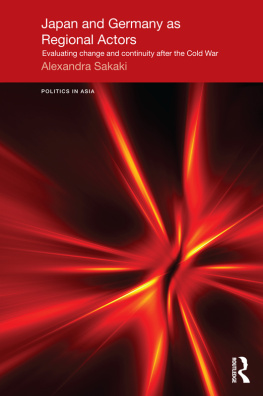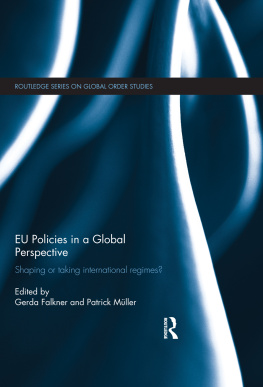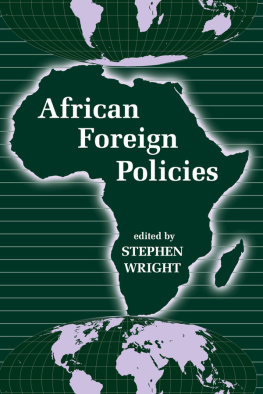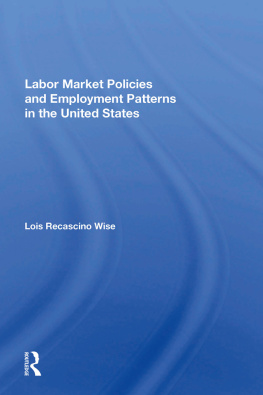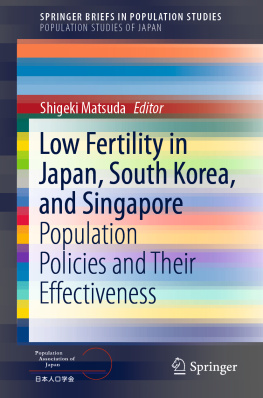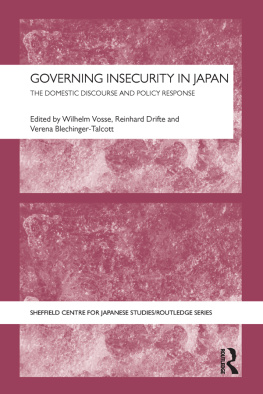Acknowledgments
The generosity, warmth, and insights of many people have enabled me to write this book. I am grateful to all of those who have helped in large ways and small, responded to my ideas, tolerated my questions, supported me financially, and given me the space to move onward, collectively buoying me to the end. Some I am able to thank here, but others, because of space limitations, I must thank privately.
Professional colleagues in Japan have contributed a wealth of knowledge and practical help. Fujiwara Kiichi and Ishida Hiroshi sponsored my year at the Institute for Social Science at the University of Tokyo, and Masuyama Mikitaka (now at the National Graduate Institute for Policy Studies) sponsored my stay in 2001 at Seikei University in Tokyo. Colleagues at both institutions were generous in discussing my work and introducing me to others. Chitose Yoshimi of the National Institute of Population and Social Security Research has been a colleague, friend, and supporter, introducing me to scholars working on immigration, sending me materials, and providing encouragement. Tsukasaki Yko of the Ministry of Health, Labor, and Welfare has been a generous friend in offering her understanding of current immigrants employment issues and in arranging appointments with government offices. Okamoto Takiko of Meiji Gakuin University, a friend for decades, always manages to see me when I visit Japan despite her forever busy schedule. Yoshimura Tru, the first president and now special consultant for the National Graduate Institute for Policy Studies, has been gracious over the many years as I worked on this book. I owe a special debt to Iguchi Yasushi of Kwansei Gakuin University for making time for me on many occasions and to Ikegami Shigehiro for including me as a speaker in 2009 at a day-long symposium held by the Shizuoka University of Art and Culture. I also benefited from participants comments on early presentations I made at Kwansei Gakuin University and Seikei University, as well as the comments of Yamawaki Keiz at a presentation at the German Institute for Japanese Studies in Tokyo. Other scholars and experts in Japan who have shared time and insights include Higuchi Naoto, Kashiwazaki Chikako, Kat Junko, Kitawaki Yasuyuki, Kojima Hiroshi, Terry MacDougall, Takenoshita Hirohisa, and Tanabe Shunsuke.
I could not have taken on the Korean case without the openness and cooperation of scholars in Korea. Lee Jungwhan of Cheongju University took me to visit many migrants shelters and responded whenever I had questionsI cannot thank him enough. Others who have shared their time and research are Chung Ki-seon of the International Organization for Migration in Seoul, Lee Hye-kyung of Pai Chai University, Seol Dong-hoon of Chonbuk National University, and Yoon In-jin of Korea University. I am grateful to all of you and hope that I have fairly represented your work.
In Japan and Korea, I have met only openness from the many national and local officials, staffs of local international centers, and NGO representatives who have allowed me to take up their time and have willingly explained local conditions. Those at the national ministries are too numerous to count. I am grateful to officials from the cities of Fukuoka, Hamamatsu, Iwata, Nagoya, ta, Toyota, and Yokohama, and from Aichi and Kanagawa Prefectures, not to mention the staffs from the affiliated international centers. At Ijren, Watanabe Hidetoshi and Yano Manami met with me multiple times over the years. In Korea, national officials, Ansan city officials, and many shelter directors gave liberally of their time.
In North America, I have benefited from colleagues who have shared their perspectives. Glenda Roberts, Leonard Schoppa, and Takeyuki Tsuda at points along the way commented on papers related to the book. A brief stay at the Center for Strategic and International Studies as a Japan Policy Fellow supported by the Japan Foundation Center for Global Partnership enabled me to try out my ideas and to make new contacts through the sponsorship of Japan chair Michael Green. Pat Boling of Purdue University has been a loyal friend as we have made our parallel journeys of working on multicountry comparative projects. Ito Peng has challenged me to meet a high standard. John Campbell, professor emeritus of the University of Michigan, has always been ready to provide advice. Members of my virtual writing group of over five years, none of whom Ive met in person, have sustained me through the process with wit, encouragement, and day-to-day stories of meeting challenges. At Cornell University Press, Roger Haydons readiness to take on this book and shepherd it through the process has made a world of difference. Two anonymous readers for the Press gave me extremely helpful comments and suggestions on the manuscriptI have incorporated almost all of them.
Financial support for the book has come from many sources. An Abe Fellowship in 199596 made possible through the Japan Foundation Center for Global Partnership allowed me to begin to develop the project through a year-long stay in Japan. Support from the Japan Society for the Promotion of Science in 2001 allowed me to conduct research for seven months in Japan. I have received other funds over the years for shorter stays in Japan from the Northeast Asia Council of the Association for Asian Studies and from the College of Arts and Sciences and the College of Liberal Arts and Human Sciences at Virginia Tech.
At Virginia Tech, supportive colleagues include Bruce Pencek, political theorist and Virginia Tech librarian, who vetted earlier versions of the introduction and chapter 1, and Chris Hays, who edited several chapters at an early stage. Two department chairs, Ilja Luciak and Tim Luke, have shielded me from extra responsibilities so I could work on the book. Karen Hult has helped me to keep priorities clear. When it came to contacts in Korea, conducting interviews, translating materials, and obtaining documents from Korea, doctoral students from the Center for Public Administration and Policy at Virginia Tech, who have since earned their degrees and moved on, provided invaluable assistance, including Boo Hyeong-wook, Kim Se-jin, Lee Maeng-joo, and Park Soo-young. Undergraduates Ivy Choi, Chan-hyuk Kang, and Maria Kim also helped in deciphering Korean materials.
I am fortunate to be part of a large immediate and extended family that has encouraged me and provided welcome distractions. My mother Georgia Bywaters Milly has been a model for how we can continue to learn and grow at any age. My siblings, especially my sister Susan Milly Davenport, have rooted for me in the midst of family ups and downs. Special thanks go to my niece Michelle Milly Rodriguez for staying close to mom and for her posts. Finally, but far from least in my thoughts, Bob DIntino has stayed with me through it all. I dont think there is anyone else who could so ground me, keep me laughing, and give me the space to work on this project for so many years. I thank him most of all.


